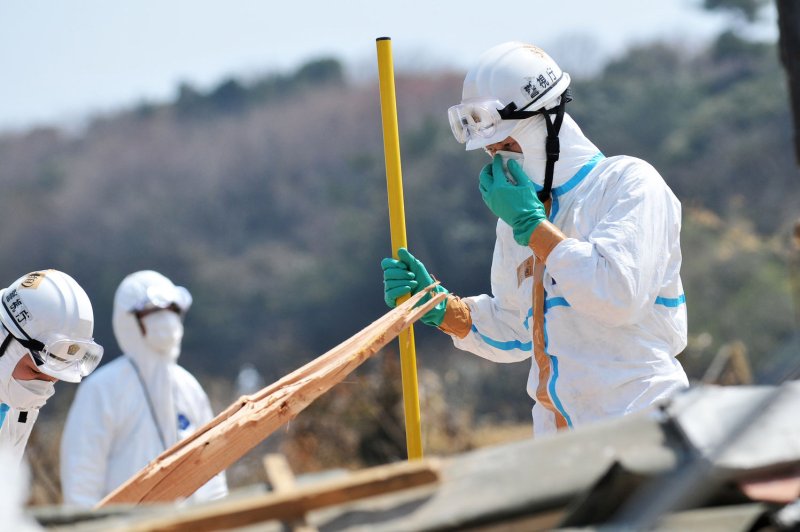1 of 2 | Japanese police, wearing chemical protection suits, search around the Fukushima Daichi Nuclear Power Plant in Minamisoma, Fukushima prefecture, Japan, on April 15, 2011 -- about a month after the disaster. File Photo by Keizo Mori/UPI |
License Photo
Dec. 23 (UPI) -- Radioactive water that's being stored at Japan's disabled Fukushima Daiichi Nuclear Power Plant could be eliminated by releasing it into the Pacific Ocean, a government-appointed panel proposed Monday.
The committee advising the Japan's Ministry of Economy, Trade, and Industry made the suggestion as one of two possible options for dealing with the nearly 1.2 million tons of tainted wastewater in above-ground tanks at the complex.
The water, which is now laced with radioactive tritium, was used to cool the the plant's molten reactors after they melted down in March 2011 during one of the most severe nuclear accidents in world history. The accident at the coastal plant was caused by a tsunami that was triggered by a powerful earthquake at sea.
The plant's operator, Tokyo Electric Power Co., said last month the storage tanks are expected to become full by next summer, as the water level is rising by 170 tons per day. Japan's Economy, Trade and Industry Ministry said then it would be safe to dispose of the water in the ocean, because the amount of radiation would be small compared to what humans are normally exposed to
In draft proposals Monday, the industry ministry panel reduced the list of potential solutions to two -- either a slow release into the ocean or evaporation. Three other options were ruled out due to lack of feasibility.
The industry ministry will consider the committee's recommendation in making the final decision.
The Japanese fishing industry is opposed to releasing the contaminated water into the Pacific.
Greenpeace Japan quickly condemned the panel's recommendation Monday, saying the ocean dump poses an "immediate threat" to the environment and "highlights the government's complete failure to consider safer alternatives."
"There is no justification for additional, deliberate radioactive pollution of the marine environment or atmosphere," said Shaun Burnie, a nuclear specialist at Greenpeace Germany. "Any decision to discharge over one million tons of highly radioactive water into the Pacific or into the atmosphere is clearly a direct concern to the people of Fukushima, including fisheries.
"This is not just a domestic issue, and the government of Japan must explain to the international community -- including its nearest neighbors in Asia -- why it advocates for the water discharge into the Pacific Ocean or release to the atmosphere. ... Today's development only makes Greenpeace more determined to stop these radioactive discharges."















